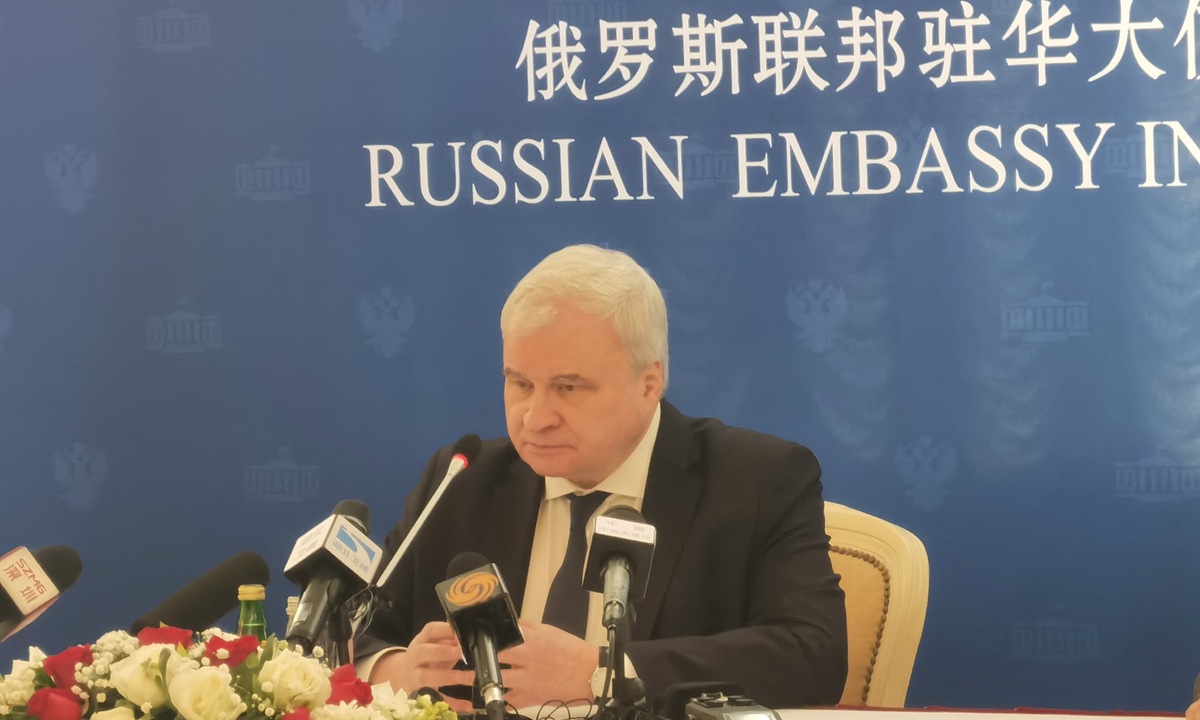Moscow sends 500-member delegation to Beijing 2022: Russian envoy
China-Russia ties see qualitative leap in 2021, but no military alliance

Russian ambassador Andrey Denisov Photo:Hu Yuwei/GT
Sending a large delegation of over 500 members to the Beijing Winter Olympics and opposing a political boycott represents the latest Russian support to China, apart from maintaining the solidarity with China in core sovereign and security interests. Russia and China have seen a qualitative leap in relations in the past year and will step up cooperation in vaccines, aerospace projects, energy, and natural gas, but not a military alliance, the Russian ambassador to China said on Tuesday.
Amid escalating global tensions which have directly affected China and Russia, both countries should not be blamed as they have made joint efforts to overcome difficulties, safeguard global peace and stability and help avoid the situation spiraling out of control, Ambassador Andrey Denisov stressed at a Tuesday press conference.
Russia plans to send a 500-member delegation, including 216 athletes, as well as coaches, medical workers and service support staff, the biggest foreign delegation to the event.
Denisov said that the Olympics are a highly expected event and that he believes China can host the event with high quality, and overcome the difficulties posed by COVID-19.
Denisov denounced the so-called "political boycott" of the Games, saying people want to sabotage the event for narrow political interests, which damages their own interests. Such efforts are futile as people know that they have no valid basis, and the slanders will fade away, he noted.
Russian President Vladimir Putin, at the invitation of China's President Xi Jinping, will visit Beijing on February 4, on the opening day of the Winter Olympic Games, and talks at the highest level will be held the same day, TASS reported.
"We are standing together [with China] against the politicization of sports and demonstrative boycotts," Putin said at a meeting with athletes of the Russian national Olympic team on Tuesday. "We are supporting traditional Olympic values, first of all, equality and justice."
Putin will be among the first group of state leaders to visit China since the COVID-19 pandemic. "We very much expect Putin's visit to China to bring new hope for the resumption of normal exchanges between the two countries," Denisov told the Global Times on Tuesday.
When asked if there is a prospect of a military alliance between China and Russia amid increasing global tensions, the ambassador said the two countries have kept close cooperation in all areas and maintained communication in sensitive areas, so there are no plans for a military alliance in the foreseeable future.
Russia always supports multilateral diplomatic channels in promoting world peace and stability, said the ambassador. "The practice of forming narrow military alliances by certain countries is outdated. For instance, the UK, US and Australia formed the AUKUS and it is clear to us who the alliance is targeting. We don't wish to repeat, and we don't see any incentive in a military alliance."
The Russian ambassador said there are no taboo topics in bilateral relations, even on sensitive security issues such as the Ukraine issue, the South China Sea disputes and Taiwan question. Affairs involving Ukraine and Taiwan are two very different issues, with very different contexts, which China and Russia have made their position clear to each other, the ambassador said.
We also believe that intervention by external forces is the main reason driving the recent escalation in tensions across the Taiwan Straits, said the ambassador.
The international situation is becoming complicated, as seen in Russia's deteriorating ties with the US and the EU, and China's relations with the US and EU also face many difficulties. However, China and Russia have never been rule breakers and trouble makers, he stressed. "Russia's relations with the US and Europe will not affect China-Russian relations."
US Secretary of State Antony Blinken and his Russian counterpart Sergey Lavrov met on Friday in Geneva on the Ukraine crisis.
Russian Deputy Foreign Minister Sergei Ryabkov, who led Russia's delegation in a meeting with the US, told Russian television he could neither confirm nor exclude sending military assets to Cuba and Venezuela if talks fail. Asked about these steps, he said "it all depends on the actions by our US counterparts," the Guardian reported.
"Do we fear a repeat of the Cuban missile crisis? We are not afraid of anyone, including the US. But I believe the missile crisis will not happen," the Russian ambassador said in response to growing tensions in Ukraine.
Under the strategic security consultation mechanism between the two countries, Russia has regularly updated the results of their talks with the West on issues such as Ukraine with China. And Russia has expressed specific concerns to the US and NATO, and is waiting for written responses from them, the ambassador revealed.
The Russian ambassador said he looks forward to more non-virtual people-to-people and cultural exchanges between China and Russia in the near future, especially in the Chinese-Russian years of sports exchanges in 2022 and 2023.
China and Russia will sign a new space Cooperation Program for 2023-2027 this year, which will include a plan to create an open and inclusive International Lunar Research Station (ILRS) by 2035, said the ambassador.
He also noted that there will be no political obstacles to scientific and technological cooperation between the two countries, especially on the R&D of COVID-19 vaccines. He expects the Russian COVID-19 vaccine Sputnik V to be registered in China soon.
The ambassador, who received Chinese vaccines, said he had no doubt about the quality of Chinese vaccines.
"President Putin enjoys visiting China very much, but this time his schedule will be relatively simple due to pandemic risks," said the ambassador. "President Putin's visit to China coincides with the Chinese traditional Spring Festival. I hope he will have a chance to eat dumplings during his visit."

